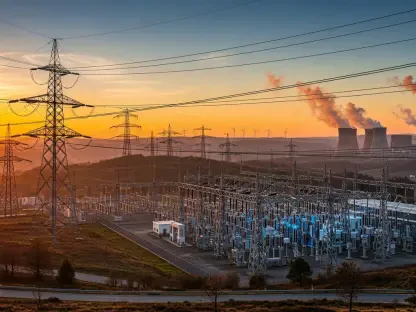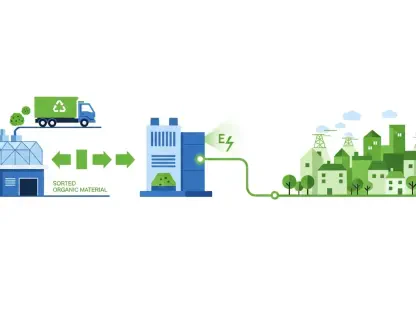The collaborative initiatives spearheaded by Utilidata and Nvidia represent an ambitious move toward enhancing grid reliability and efficiency through the deployment of AI chips. These technological advancements aim to transform how utilities such as Portland General Electric and Duquesne Light gather and utilize data about grid operations. Rather than replacing existing smart meter setups, the focus is on deploying AI in parts of the grid where more detailed, granular data collection provides the greatest benefits. This serves as a stepping stone to modernizing grid management practices, utilizing AI to optimize data collection and processing capabilities.
Leveraging Distributed Energy Resources
Impact of Renewable Energy
The integration of distributed energy resources (DERs), such as rooftop solar panels, backup batteries, and electric vehicle (EV) chargers, has the potential to significantly enhance the efficiency of grid systems. Utilities are increasingly focusing on strategies that optimize these resources to mitigate stress on the grid. For example, during peak energy demand periods, batteries can be instructed to store and later discharge solar energy. Moreover, managing EV charging schedules can prevent overloading the grid infrastructure. Such strategic utilization aims to unlock the grid’s full potential and accommodate renewable energy effectively.
As these renewable resources are adopted more broadly, utilities are tasked with adapting their grid management strategies to manage the increased complexity introduced by DERs. These renewable assets provide opportunities to reshape energy consumption patterns and enhance system resilience. By employing intelligent control systems and advanced algorithms, utilities can better harness the distributed nature of DERs to ensure seamless grid operations. This transition toward integrated energy solutions emphasizes the need for innovative approaches that align with the evolving demands of energy consumption.
Computational Needs for Grid Management
The complexity of modern grid systems necessitates the use of sophisticated computational power to monitor local conditions and enable real-time communication among distributed devices. Utilidata’s Karman technology is integral to managing these complex tasks, serving as a foundation for creating virtual power plants (VPPs) that approach the capacity and reliability of traditional gas-fired facilities. By leveraging AI, utilities can tap into previously inaccessible resources, optimizing energy production and consumption across the grid. This transformation is crucial for expanding the capabilities of existing energy systems.
Karman’s technological prowess not only offers a sustainable path to energy management but also facilitates the integration of disparate resources into a more cohesive grid operation strategy. Utilities now have the opportunity to enhance grid intelligence, paving the way for smarter, decentralized energy systems that rely on the dynamic interplay of multiple energy assets. This shift toward virtual power plants marks a significant stride in realizing more efficient and adaptable energy solutions that can cater to increasing energy demands while maintaining grid stability.
Innovations in Technology Deployment
Role of Karman Technology
Utilities like Portland General Electric are examining technologies such as Karman to comprehend and assure the reliability of virtual power plants and distributed energy resource management systems (DERMS). The incorporation of these innovative solutions offers a robust architecture for enhanced customer service and facilitates extensive data collection from the grid edge. Disaggregating power data, understanding customer consumption patterns, and monitoring various grid services are essential tasks effectively managed through AI technologies.
Integrating AI-driven tools provides utilities with actionable insights that inform both operational and strategic decisions. As energy systems grow increasingly complex, the capacity to interpret granular data in real-time becomes indispensable. These AI-enabled systems not only support reliable distribution networks but also empower utilities and consumers with data-driven insights to optimize energy usage. As national energy landscapes evolve, AI technologies play an essential role in establishing more resilient, efficient, and customer-focused energy networks.
Strategic Partnerships and Investments
Utilidata is actively advocating the incorporation of AI technologies into future smart meter deployments by engaging utilities and regulatory bodies. With notable investment from Quanta, renowned for its involvement in large-scale utility infrastructure projects, potential scaling AI technologies can enhance grid management systems effectively. Despite political uncertainties, the company is optimistic about securing supportive grants from the Department of Energy to propel these initiatives forward.
Quanta’s backing not only underlines confidence in AI-driven solutions but also highlights the scalability of such technologies across diverse energy systems. Embedding AI into smart meter technology promises to revolutionize how data is collected and analyzed, providing utilities the flexibility to adapt quickly to changing energy demands. The collaborative effort is pivotal for advancing grid intelligence and showcasing AI as a valuable asset in addressing contemporary energy challenges on a national level.
Expanding AI’s Reach in Grid Management
Exploring New Horizons
Utilidata’s vision to extend its reach internationally, transcending traditional grid setups, takes a significant leap with innovative initiatives aiming to refine power consumption on a micro level. By embedding Nvidia-enabled AI devices in data centers, there is a promising opportunity to manage energy usage efficiently, down to individual servers. This approach mimics the data accumulation process used in training large language models, positioning AI as a tool that can optimize and modernize energy systems.
The quest to revolutionize grid management does not end with domestic projects. The international expansion plan highlights the potential for AI technologies to transform energy management strategies across diverse systems globally. The incorporation of AI into data centers and server configurations heralds a new era of energy optimization, showcasing AI’s adaptability and reach in the realm of distributed energy systems. This global outreach underscores AI’s role as a transformative force in achieving greater efficiency and resiliency in energy management.
Balancing Deployment Scale
Utilidata and Nvidia are joining forces in a groundbreaking effort to boost grid reliability and efficiency by employing AI chips across various utilities, including Portland General Electric and Duquesne Light. This collaboration signifies a strategic focus on enhancing how data is collected and utilized within grid operations. Instead of overhauling existing smart meter frameworks, the initiative emphasizes deploying AI technology in specific grid areas where detailed, granular data collection provides the most significant advantages. This approach serves as a crucial step toward modernizing grid management practices, aiming to optimize the data gathering and processing capabilities systematically. By integrating AI into these processes, utilities can dramatically improve their ability to make informed decisions, thus paving the way for a more resilient and efficient energy grid. As these technological advancements unfold, they promise to redefine industry standards, laying down the groundwork for future innovations in energy management and distribution.









